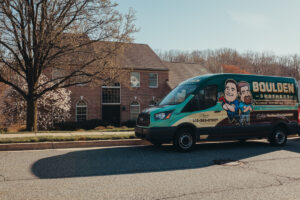Summer is so much more than the excessive heat it exudes; it ignites camaraderie through lounging by the pool or beach, fun days at the waterpark, tubing on the lake, and of course, cookouts. Few things compare to hanging out with your closest friends and family members on the back deck of your home while grilling burgers and hotdogs.

But before you fire up your trusty propane grill, there are a few things you need to do to ensure it operates safely and at optimal level so that you aren’t left with a bunch of “hangry” people.
How to Get Your Propane Grill Ready for Summer
1. Inspect the Propane Tank
The first item on your checklist you’ll want to complete is an inspection of your propane tank. These tanks have a pretty long shelf life, but if your tank is older than 12 years or you notice that it’s beginning to rust, give the propane experts at Boulden Brothers a call, and we’ll fix you up with a new one.
During your inspection, check to see how much propane you have. If you don’t have a fuel gauge, this is a cool trick we found online to approximately determine how much propane is left in your tank:
Having to tell your friends and family that the cookout has reached a halt due to low propane is the last thing you want to do.
If you need your propane tank refilled, take it to one of our 6 convenient Delaware and Maryland propane refill stations:
- 263 E. Chestnut Hill Road • Newark, DE
- 1005 Elk Mills Road • Elkton MD
- 1800 Foulk Road • Wilmington, DE
- 540 Old Barksdale Road • Newark, DE
- 199 Old Chestnut Road • Elkton, MD
- 2007 Newport Gap Pike • Wilmington, DE
When you replace a propane tank with a new one, you only get 15 pounds of propane instead of the 20 pounds that they are able to hold. This cuts your cooking time about 25%, or 4 hours.
Refilling your propane tank is the economical and environmental choice.
2. Inspect the Gas Hoses and Other Parts
Once you have completed your inspection of the tank itself, take a good look at the hoses and other parts that connect the tank to the propane grill. Specifically, check to see that the hose isn’t frayed or worn. If these parts appear to be in poor condition, have them replaced before you decide to host a cookout. Otherwise, you could be putting yourself and your friends and family in danger. Don’t risk a hazard! Talk with an expert.
3. Clean the Grill
Only when you are 100% sure that your propane tank is in tip-top shape do you then begin the cleaning process. You’re now a few steps closer to having an unforgettable night with friends and family! Begin the process by cleaning off your cooking surfaces (cooking grates and burner covers) with warm water and a scouring pad, wire brush, or even aluminum foil, whatever suits your taste.
An often forgotten aspect of your propane grill is the carbonized residue that has built up on the inside of your grill over time. Did you know that this buildup of carbonized residue can actually affect the taste of your food? To ensure a tasty burger or hotdog, clean the inside of your grill as well. As an added measure of protection, loosely cover your food with aluminum foil when grilling.
You’re ready to grill! Now that your propane grill is ready to be fired up, invite your friends and family over for a night filled with good food and lots of laughter.
There are hundreds of propane grilling accidents every year! Don’t forget to go over some propane grilling safety tips that we’ve provided here.
Make Boulden Brothers your trusted propane provider. To keep your propane tank, HVAC, plumbing, and electrical system operating at peak efficiency, follow us on Facebook, Twitter, and Google+ for more useful information and handy tips!


 Source:
Source: 






 The average lifespan of a properly maintained air conditioner is between 10 and 12 years. A number of factors play into its lifespan, but regular air conditioning maintenance is by far the biggest one. By following these guidelines, you can rest assured your unit has a better chance of survival.
The average lifespan of a properly maintained air conditioner is between 10 and 12 years. A number of factors play into its lifespan, but regular air conditioning maintenance is by far the biggest one. By following these guidelines, you can rest assured your unit has a better chance of survival.